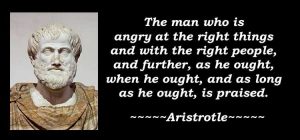What is Anger?
Anger is a natural emotion. Everybody experiences it for variety of reasons. It is an emotional response to real or imaginable feeling. Anger can be an active or a passive emotion. A person lashes out verbally and sometimes physically also when the emotion is active. In case of passive anger, it reacts by silently sulking, being quiet, eating less, remaining aloof or becoming unreceptive etc. Each person has a different pattern of reacting to anger within him/her.
Hanging on to bitterness or resentment is not at all good. It is always better to resolve issues which upset us. All of us get angry, and sometimes our anger gets out of hand. We say and do things that we later regret. Anger can be expressed in many ways; different types of anger affect people differently and can manifest to produce different actions and signs of anger. The most common signs of anger are both verbal and non-verbal. But, people who hold back resentment sooner or later become unwell.
How is Anger expressed?
It can be clear that somebody is angry from what they say or how they say it, you can see it from their tone of voice. Anger is expressed through body language and other non-verbal cues: an angry person’s face becomes red, the nostrils fluffs up, he/she stares straight into face, frowns, and sometimes clenches fists. Some people are very good at internalising their anger and it may be difficult to notice any physical signs. However, it is better to resolve anger at the earliest.
say it, you can see it from their tone of voice. Anger is expressed through body language and other non-verbal cues: an angry person’s face becomes red, the nostrils fluffs up, he/she stares straight into face, frowns, and sometimes clenches fists. Some people are very good at internalising their anger and it may be difficult to notice any physical signs. However, it is better to resolve anger at the earliest.
I look at anger as one of the best tools that helps us read and respond to upsetting social or personal situations. Many researchers have responded that anger increases optimism and creativity within us. One specific research suggests that expressing anger can lead to more successful negotiations in life or on the job. In fact, suppressing anger can actually hurt you. Dr. Ernest Harburg and his team at the University Of Michigan School Of Public Health spent several decades tracking the same adults in a longitudinal study of anger. They found that men and women who hid the anger they felt in response to an unjust attack subsequently found themselves more likely to get bronchitis and heart attacks, and were more likely to die earlier than peers who let their anger be known when other people were annoying.
Aristotle said that anger can be good for you because it’s designed to protect us, our relationships and our way of seeing the world. In the everlasting battle between right and wrong, the bodily effects of anger are meant to tell us that something is wrong.
Do you know that the earlier US President Bill Clinton was once the leader of the fre e world, but this iconic politician came from humble beginnings? As a junior high schooler, he was picked on insistently for being a “fat band boy” with bad taste in clothes. Their taunting culminated in an incident at a junior high dance: one older student teased Clinton about his carpenter’s jeans, and even hit Clinton in the jaw. But Clinton did not give the bully what he wanted, choosing to stand his ground rather than fight back or back down. Clinton shares in his memoir, My Life, “I had learned that I could take a hit and that there’s more than one way to stand against aggression.” He survived the incident, and his status as a band geek paid off, with Clinton becoming a talented and celebrated saxophone player in addition to his life in public service.
e world, but this iconic politician came from humble beginnings? As a junior high schooler, he was picked on insistently for being a “fat band boy” with bad taste in clothes. Their taunting culminated in an incident at a junior high dance: one older student teased Clinton about his carpenter’s jeans, and even hit Clinton in the jaw. But Clinton did not give the bully what he wanted, choosing to stand his ground rather than fight back or back down. Clinton shares in his memoir, My Life, “I had learned that I could take a hit and that there’s more than one way to stand against aggression.” He survived the incident, and his status as a band geek paid off, with Clinton becoming a talented and celebrated saxophone player in addition to his life in public service.
How does Anger help?
Anger is motivational force: You sometimes hear people talking about using anger as a motivating force by turning their anger into positive energy. In fact anger itself is a kind of positive energy and a powerful motivating force. Research has shown that anger can make us push on towards our goals in the face of problems and barriers. Anger tells us not to stop or limit ourselves.
Anger helps in protecting: When you or somebody closer to you is in danger your mind automatically kicks into finding solutions immediately. You don’t have time to stop and ponder a course of action when one of your near and dear is in some serious problem. Anger short cuts our thinking brain to allow us to act quickly. This is nature’s way of protecting your family from harm.
Anger enhances leadership skill: When you appear to be angry and carry on an intense conversation or presentation, you ignite new ideas, thoughts and feelings. Your intensity allows you to call the shots. Steve Jobs is famous for his anger, although he hardly controlled it.
Anger makes a person practical: When you are angry, your attention is laser-focused on the wrong issue. That gives you great problem-solving skills, and the ability to focus on the solution. All great leaders like M.K.Gandhi, Nelson Mandela used their anger for finding solutions to their nation’s problems.
Anger teaches: Our anger management styles are learned from our own parents. If Mom was a yeller, we may follow her example, even if we vowed never to yell at our kids. Fortunately, if you learned one anger expression style you can learn another. Disconnect the idea that feeling angry is bad. That is natural and unavoidable but what you do with those hot emotions is completely under your control; one needs to practice the art of using anger for benefit. Allow yourself to find new ways to cope with daily parenting hassles by taking a class or reading a book on anger management, or see a counsellor.
There are so many people around us who have used anger as a motivating force by turning anger into positive energy. The fact is that anger itself is a kind of positive energy and a powerful motivating force. Anger helps us in pushing our goals in the face of problems and barriers. The caution around anger is to manage it positively: it should not be overused, or used with everyone.
When the South African actress Charlize Theron was only 15 years old, she witnessed her mother shoot her alcoholic and aggressive father out of self-defence. But instead of letting the trauma define her future, she looked to her mother’s protective example of strength and worked to build an amazing sense of confidence of her own. She continued to pursue her acting career, and she ultimately became the first South African actress to win an Academy Award. In an ABC News Interview with Diana Sawyer, Charlize Theron said she views that experience as a tattoo on her heart. “It’s a part of me, but it doesn’t rule my life,” she said.
The expression of authentic anger can be entirely appropriate with certain people in certain situations. The question is how you do that without letting it go too far. One can train the mind to control anger wherever possible and learn the tactics of the right way to get mad.














































